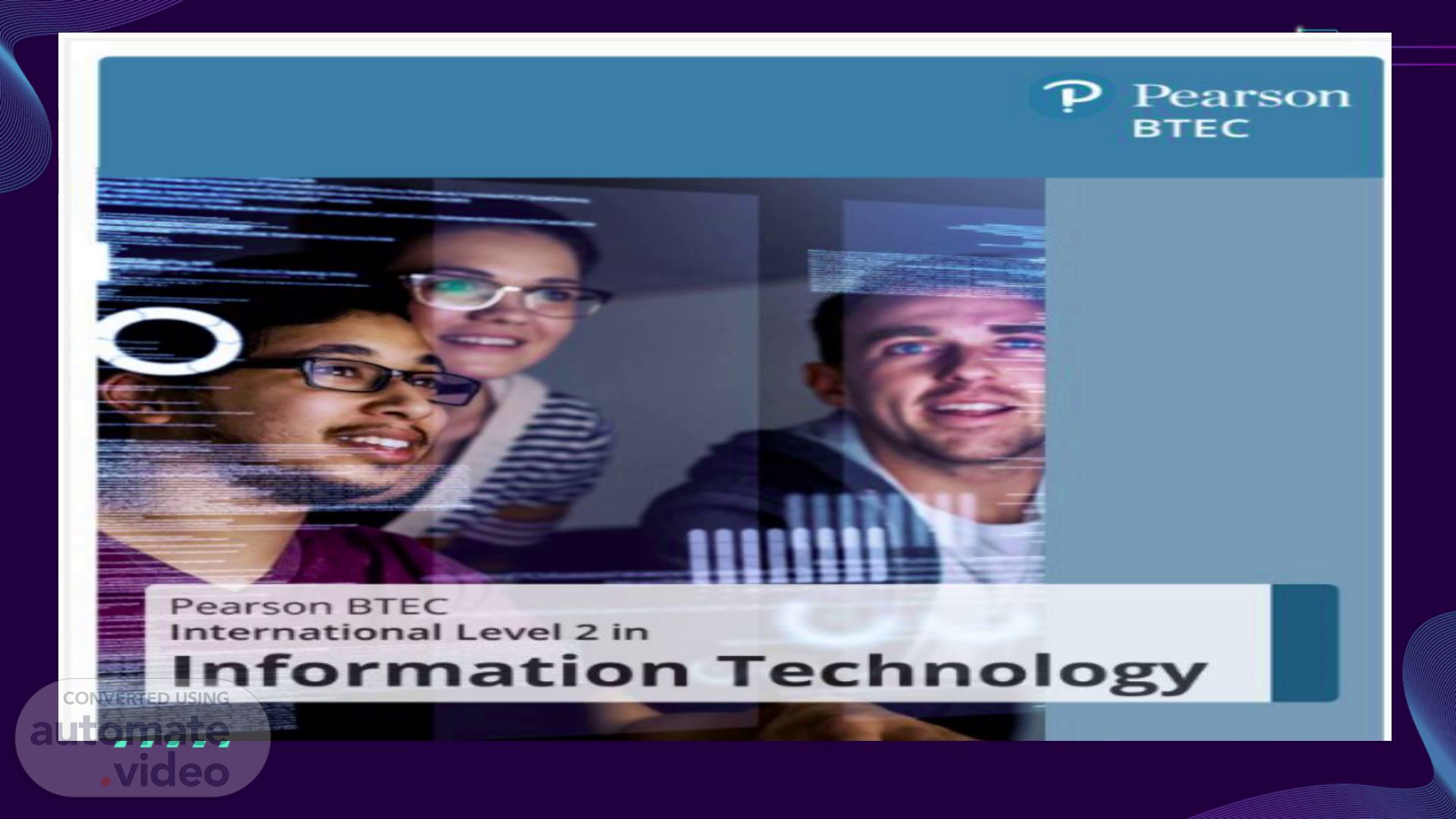
PowerPoint Presentation
Scene 1 (0s)
[Audio] . Pea rson BTEC Pearson BTEC International Level 2 in Inforrr•ation Technology.
Scene 2 (6s)
[Audio] Introduction The Pearson BTEC International Level 2 qualifications in Information Services covers a variety of areas across the IT sector. Learners can take units introducing them to programming, digital graphics and animations, website, app and games design, and computer networking. In addition to the sector-specific content available in these qualifications, the requirements mean that learners develop the transferable skills needed to progress to further education or employment. These qualifications are designed to enhance the curriculum and prepare learners for the ever-changing world of work. BTEC International Level 2 qualifications allow learners to progress to study at Level 3 and above or to the workplace.
Scene 3 (54s)
[Audio] What do these qualifications cover? The content of these qualifications has been designed to support progression to roles in IT, most likely via further study at Level 3 and then through higher-education routes in the particular areas. All learners will be required to take mandatory content that is directly relevant to progression routes in all of the identified areas. In addition, learners take optional units that support the progression route identified in the qualification title..
Scene 4 (1m 26s)
[Audio] What could these qualifications lead to? These qualifications support progression to further study in IT, for example: Pearson BTEC International Level 3 qualifications in Information Technology..
Scene 5 (1m 41s)
[Audio] How do these qualifications provide transferable skills? In the BTEC International Level 2 units, there are opportunities during the teaching and learning phase to give learners practice in developing transferable skills. Where we refer to transferable skills in this specification, we are generally referring to skills in the following three main categories: cognitive and problem-solving skills – using critical thinking,approaching non-routine problems, applying expert and creative solutions,using systems and technology interpersonal skills – communicating, working collaboratively,negotiating and influencing, self-presentation intrapersonal skills – self-management, adaptability and resilience,self-monitoring and development.
Scene 6 (2m 32s)
[Audio] Course content Mandatory units: There are mandatory unit, which includes 1 set assignment unit. Learners must complete and achieve a Pass or above Unit1: Using IT to Support Information and Communication in Organisations Unit 2: Data and Spreadsheet Modelling.
Scene 7 (2m 51s)
[Audio] Set assignment units. Set assignment units.
Scene 8 (3m 11s)
[Audio] Optional units: Learners must complete at least two optional units Unit 3: Setting up a Technology System Unit 4: Introduction to Computer Networking Unit 5: Introduction to Programming Unit 6: Introduction to Digital Graphics and Animation Unit 7: Introduction to Website Development Unit 8: Introduction to App Development Unit 9: Introduction to Games Design Unit 10: Introduction to Database Systems.
Scene 9 (3m 46s)
[Audio] Guided Learning Hours (GLH) Units have a GLH value of 60. This indicates the numbers of hours of teaching, directed activity and assessment expected. It also shows the weighting of the unit in the final qualification grade..
Scene 10 (4m 3s)
[Audio] Grading for units and qualifications Units are assessed using a grading scale of Distinction (D), Merit (M), Pass (P) and Unclassified (U). All mandatory and optional units contribute proportionately to the overall qualification grade, for example a unit of 60 GLH will contribute double that of a 30 GLH unit..
Scene 11 (4m 27s)
[Audio] Benefits Practical Skills Development: BTEC ICT courses focus on providing students with practical skills and knowledge relevant to the field of ICT. You'll gain hands-on experience in using various software, hardware, and systems commonly used in the industry. These practical skills can make you more employable and ready to tackle real-world ICT challenges. BTEC ICT courses are designed to align with industry standards and practices. The curriculum often reflects the latest trends and advancements in the field. This ensures that you acquire skills and knowledge that are directly applicable to the ICT industry, increasing your employability. It also provides a solid foundation for further specialization or higher education in specific ICT fields..
Scene 12 (5m 17s)
[Audio] Recognition and Progression BTEC qualifications are widely recognized by employers and educational institutions. Completing a BTEC in ICT can enhance your employability prospects, making you a desirable candidate for entry-level positions in the ICT industry. Moreover, BTECs can also provide a pathway for further education, such as pursuing a higher-level BTEC qualification, a university degree, or professional certifications in ICT..